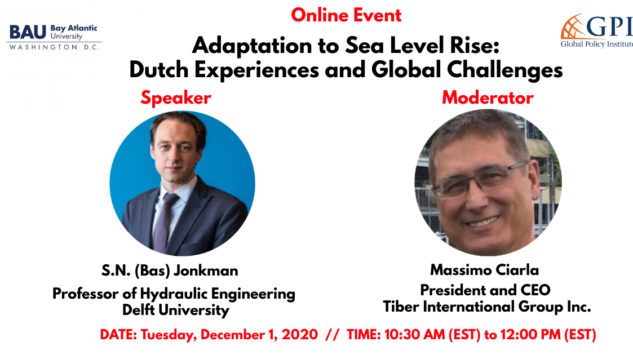Events

Adaptation to Sea Level Rise: Dutch Experiences and Global Challenges
Adaptation to Sea Level Rise: Dutch Experiences and Global Challenges
Rising sea levels due to the massive meltdown of ice caused by global warming are occurring now. As oceans rise, hundreds of millions of people living in coastal areas all over the world are already exposed to severe flooding, and much worse. Experts and public officials are busy designing and building countermeasures in order to save cities and communities. The Netherlands, a country barely at sea level, with large portions of its landmass actually below sea level, over the centuries accumulated a great amount of expertise on how to protect its land and people from the sea.
With the help of a well-crafted slides presentation, Jonkman explained how the Netherlands people over the centuries dealt with the huge challenge of living in a largely below sea level country. With persistence and ingenuity, the Dutch developed better and diverse barriers aimed at preventing flooding or worse. Today, Dutch scientists, engineers and policymakers are all involved in a major national effort to build bigger, stronger, and more resilient barriers aimed at countering significant sea level rise due to the massive melting of polar ice caused by global warming. Jonkman walked the audience through a variety of mitigation measures, many of them tried and tested and others in the planning stages. He pointed out that countermeasures have to be tied to the probable rise of sea levels, something that we do not know for certain, but likely to be worse than what was foreseen only a few years ago. He also noted that starting now, when the situation is problematic but not yet dramatic, is the wise course of action. Being proactive means better planning and eventually lower costs for the array of coastal barriers, sea wall, dikes and other mitigation measures that must be built in order to prevent higher sea levels from flooding the country. Switching to the US, Jonkman pointed out that the Gulf Coast is an example of a region at high risk. Indeed, without new barriers and other man-made countermeasures, the port of Galveston and the city of Houston may very well disappear under water in a few years. In dealing with the threat represented by rising sea levels caused by global warming, the US is at a disadvantage compared to the Netherlands because this is a new problem for American scientists and policymakers. Hence the importance of dialogue and communication among experts, so that best practices are highlighted, and the most cost-effective solutions adopted, in Europe, in the US and all over the world.